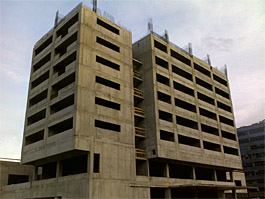
Analysts: The decline in construction is not a surprise, it may calm prices
 |
According to data published today by the Czech Statistical Office (ČSÚ), construction output in the Czech Republic accelerated its year-on-year decline after the summer holidays. In September, it decreased by 3.7 percent in real terms.
"Worse results in construction are not surprising, as this sector typically suffers with the economic downturn. This year, its situation is additionally complicated by the extreme rise in energy and construction material prices, which have at times been in short supply,” said Petr Dufek, chief economist of Banka Creditas.
According to BHS chief economist Štěpán Křeček, the reduced flow of money from the mortgage market to the real estate market is decreasing the demand for property purchases. This is currently manifesting in a reduction in the number of transactions being completed. If this situation persists for a longer time, property prices may start to decline, he stated.
Some developers have already indicated that they might prefer to postpone certain projects, but those under construction are trying to complete them. "In order to start generating profit. New apartments on the market could lead to stagnation or even a slight decrease in property prices,” Křeček estimated.
The shortage and high prices of construction materials, together with more expensive financing, should continue to be the main factors for the ongoing negative development in construction for the rest of the year, said Komerční banka analyst Kevin Tran Nguyen. He added that in residential housing, he expects property prices to stagnate in the near future. "The price declines should primarily be recorded in the categories of energy-intensive and recreational properties,” Tran Nguyen stated.
Dufek believes that the slowdown could lead to a calming effect on construction material and construction work prices by the turn of the year. A smaller supply of new apartments and houses will, according to him, contribute to price stabilization and, last but not least, further development of rental housing in the Czech Republic. However, he does not see favorable prospects for construction in the coming months. "There is a buffer in the form of additional funds from the so-called recovery fund, but it is questionable how quickly those can be activated,” he noted.
The mild decline in engineering construction is also attributed to the shape of the state budget, as well as restrictions on investments by regions and cities, believes Ondřej Šuch, head of external relations at Skanska Central Europe. In civil engineering, he says, there is a noticeable ongoing caution from investors. "If we add the constant shortage of reliable subcontractors and inflation, more careful planning is required. In such situations, each construction project is evaluated not only by price but also by the likelihood of its successful completion within the specified time and quality,” Šuch said.
According to Peter Markovič, CEO of Xella (producer of Ytong for the Czech Republic and Slovakia), this year the residential market will be driven by renovations. According to his estimates, they will increase by approximately 20 percent year-on-year. The high prices of properties and expensive mortgages, rather than insufficient construction, are hindering faster market development, Markovič believes.
The English translation is powered by AI tool. Switch to Czech to view the original text source.
0 comments
add comment
Related articles
0
07.10.2024 | Residential construction in the Czech Republic continues to decline, with Prague being the exception.
0
10.11.2022 | Construction workers expect a decline of 4.6 percent next year according to a survey
0
23.02.2022 | Construction companies: Building cannot be done without Ukrainians, the visa process needs to be shortened
0
28.06.2021 | Czech construction ranked 18th in the EU in the first quarter based on performance
0
07.05.2021 | Construction will ease the decline this year, the problem is the lack of built apartments
0
08.04.2021 | Construction in the Czech Republic fell sharply in February, the most significant drop since July 2016
0
12.03.2021 | The January decline in construction was mainly caused by worse weather
0
07.07.2020 | The decline in construction in the Czech Republic has accelerated, dropping by 7.6% in May.
0
25.03.2014 | The 2014 Pritzker Prize was awarded to Shigeru Ban
0
26.11.2007 | The shortage of people affects wage negotiations in construction





